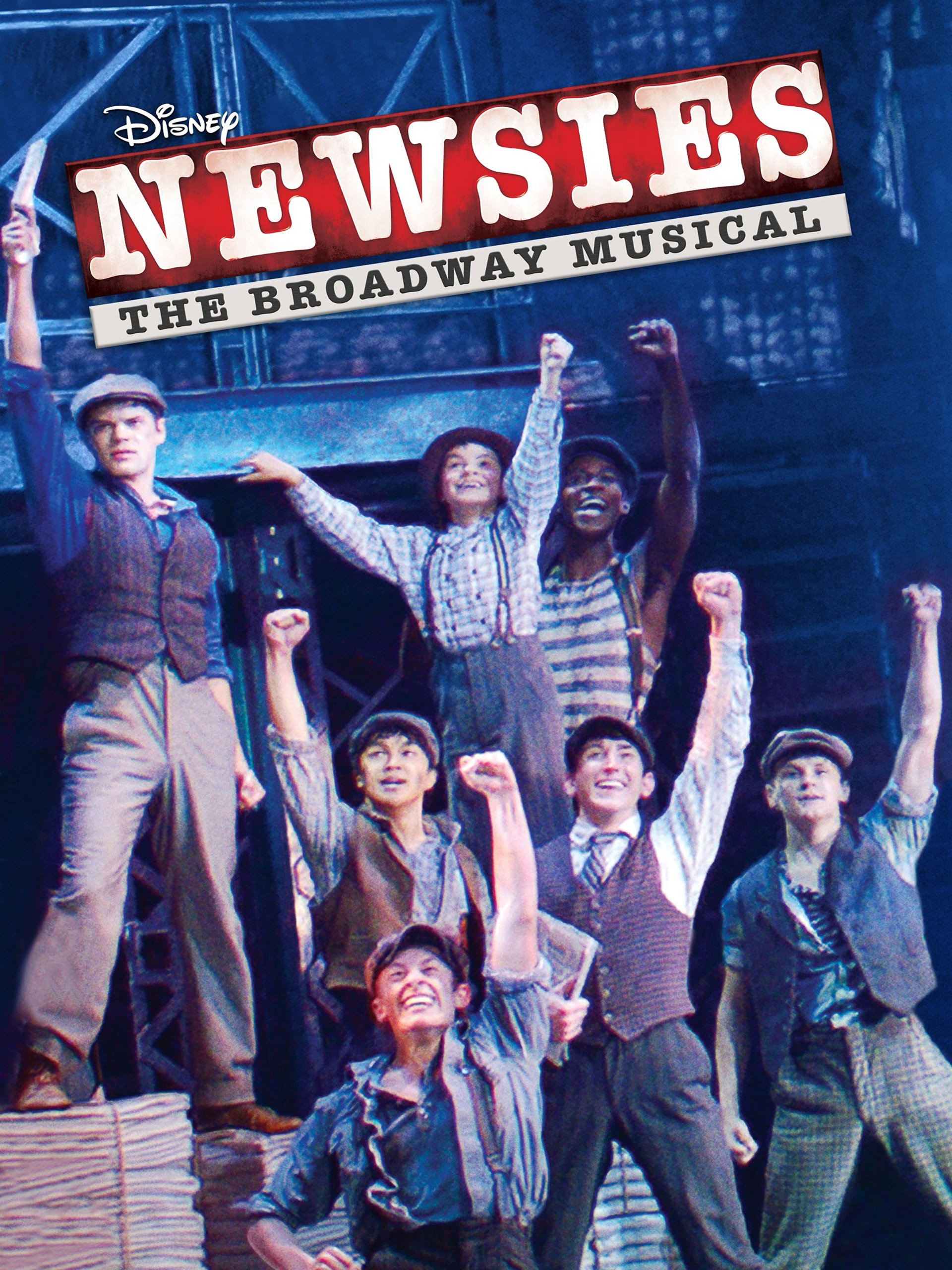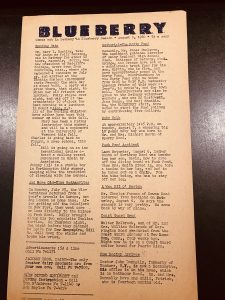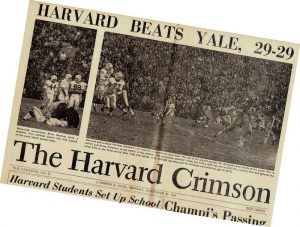
I have always loved newspapers — both their production and their consumption. As to the latter, I even read the New York Times religiously as a kid, despite the fact that, in those days, out of town subscriptions were delivered by mail one day late. I am now about evenly split between digital and print copies of the Times and other newspapers, but they remain, in some format, a daily feast. And, as to the former, in considering this week’s prompt, I realized, in retrospect (ahem), that, while a journalism career was obviously not my Manifest Destiny, it was a likely one for me to follow. But it never came to pass. Let me briefly “unfold” this below.
As I described in this story a few years ago, we kids in our neighborhood put out a summer newspaper when I was growing up called the Bethany Blueberry — Bethany being our hometown and, as per the masthead, the Blueberry “[came] out in Bethany in Blueberry Season.” Briilliant, no? Here’s a copy:
The Blueberry gave me the newspaper bug early on. Then, in ninth grade, I became the editor of our junior high school newspaper, though I barely remember a thing about it. The next year, as a sophomore at our high school, I immediately joined the Trident, the school newspaper, so named because we were a regional school district comprised of three towns. I quickly became totally immersed in the Trident. So much so that I was named Editor-in-Chief at the beginning of my junior year, an unprecedented appointment which I think I deserved but which mightily p*ssed off a couple of seniors on the staff who thought it was their “turn.”
I loved everything about the Trident (except maybe the deadlines), particularly since, it being a high school newspaper and me being the Editor-in-Chief, I got to do a bit of everything for the next two years. So, with my co-staffers, I thought up articles, assigned articles, edited articles, wrote articles, wrote captions, wrote headlines and, of course, wrote editorials. And, though we had a couple of photographers on our staff, I also took some of the photos myself, particularly at sporting events — usually the most interesting photo opportunities available in light of the Trident’s limited subject matter scope. And then there was the layout of every page of every issue, which was a major synthesizing effort of editing, aesthetics and logistics.
Happily, when I graduated from high school, the faculty advisor gave me an inscribed leather-bound volume with every issue of the Trident from my three years on it. I still have the volume and take it (carefully) to our high school reunions, where it is pored over by my old classmates. Here is a great cover photo of one of our basketball games from an issue my senior year:
 (I wish I could take credit for the photo, but I didn’t take it.)
(I wish I could take credit for the photo, but I didn’t take it.)
And here is the masthead/editorial page from the same issue:
 (Note, in particular, the heroic editorial on the controversial computer dance issue.)
(Note, in particular, the heroic editorial on the controversial computer dance issue.)
My enthusiam for becoming a “newsie” when I went off to college only increased after a campus visit to Wesleyan during mid-winter break of my senior year in high school. I ended up rooming in a very non-fraternity fraternity house (this was Wesleyan after all, not Dartmouth) with a bunch of very nice guys including the Editor-in-Chief of Wesleyan’s newspaper, the Argus. The editor’s last name was Drummond and everyone called him “Ace” Drummond, after the hero of a 1930’s comic strip and movie serial about an aviator. (I don’t think I ever learned Ace’s real first name.) Anyhow, Ace was terrific — particularly to a “sub-frosh” such as myself — and, not surprisingly, very enthusiastic about the Argus and my own school newspaper experience. I thought it would be great working on the Argus with Ace, though I later realized that, as he was a senior, he would have graduated by the time I arrived on campus. Plus my father had made it fairly clear to me that, as he gently put it, “If you get into Harvard, you go to f*cking Harvard.”
Anyhow, I did get into f*cking Harvard, and originally had every intention of joining (or, actually, trying out for) the Crimson, Harvard’s student newspaper. But the summer before I started, a good friend of mine, who had gone to my high school a couple of years ahead of me and was then a sophomore at Harvard, explained how things would work: “You can either go to Harvard or be on the Crimson, but you can’t do both.” In other words, the Crimson was a more than full-time commitment, and you had to be chosen to be on it, much like playing football at a Division I powerhouse school, and the students on the Crimson simply were unable to participate in other college activities — including, often, their academic studies. The Crimson was, in effect, your major, your minor and everything in between.
It was very good advice and, after discussing it with my parents, I decided I was not so committed to a career in journalism that I was willing to foresake the broader college experience. So, to keep the football metaphor going, I punted on the Crimson. And, once I got to Harvard, I found that the advice was exactly right, at least for me. By way of example, the journalist/author/critic/producer Frank Rich was a classmate who ostensibly lived in my residential house. He churned out some amazing pieces for the Crimson during that time (mainly movie and theater reviews), but if I saw Frank in our house dining room for meals more than a handful of times during our three years there, I would be shocked. He basically lived in the Crimson’s offices a few blocks away.
Though I chose not to write for the Crimson, as a loyal son of Cambridge, I can’t help but share its most famous headline:
After college, I pretty much burned all bridges for becoming a “newsie” by going to law school. However, even then, the main reason that I chose to join the law firm that I did right after graduation in 1974 was because it represented the New York Times and had just won the Pentagon Papers case for the Times in the Supreme Court. I had fond dreams of myself becoming a famous First Amendment lawyer. But the group that did that work at my firm — a really small number of really brilliant lawyers — did not need any more warm legal bodies to join them, and I was soon doing accountants’ liability and other more standard corporate litigation work. No regrets — as mentioned in previous stories, I made a very nice career out of this practice — but not exactly the same frisson as representing crusading journalists.
In short, I never became a “newsie,” at least in terms of ever working for a newspaper. (Or, for that matter, even delivering one as a kid, which is what the musical “Newsies” is actually about.) Though I must say the weekly “deadline” for writing Retro stories does seem to resemble what I imagine having a weekly newspaper column would be like. Though it doesn’t pay quite as well. On the other hand, the comments are kinder.





Wonderful recollections of your years in school journalism, John. Amazing that you were editor of The Trident all three years of high school and your faculty advisor gave you a leather-bound copy of all your editions – a real treasure. I would also lovingly save that! (Yes, I enlarged your photo, saw your name on the masthead and read your op-ed about the dance; good one.)
Thank you for enlightening us non-Harvard types about the vast commitment it was to be chosen by the Crimson (I read Frank Rich for years), and I saw the documentary “Harvard Beats Yale 29-29”. That was a great one, inspired Garry Trudeau to go on to create “Doonesbury” about his time at Yale and the football heroes of that game (he was editor-in-chief of Yale’s humor magazine).
Your devotion to the printed word is evident in all your writing for Retro.
Too kind, Betsy, but thanks. And, to be fair, I was only editor of the Trident for two years: I had to prove myself sophomore year (or suck up to the faculty adviser, as the jealous non-editors the year ahead of me no doubt thought of it).
Gary Trudeau had started writing “Doonesbury” while at Yale, obviously modeling B.D. after their star quarterback Brian Dowling, and even we Harvard guys knew about his strip and loved it back then. In fact, Frank Rich was a big fan and even reviewed a musical based on “Doonesbury” in the 80’s: http://www.perfectstrangers.tv/nytimes112283.htm
So glad you are exercising some of your journalistic aspirations every week on Retrospect. As one of your loyal readers, I enjoy your perspective on the topic of the week as well as sharing your aspiration to be a journalist. This was a fun piece to read!
Thanks, Laurie. Much as I enjoy Retro, I am aware that my efforts are those of an amateur, at best. But, like imagining myself at Centre Court at Wimbledon, it is fun to think of myself as a real live “journalist” from time to time.
Thanks for including the famous Harvard Beats Yale headline—I was at that game and can attest to fact that we in the crowd definitely considered it a major victory! What a great gift you got with the bound copies of the Trident—you got your Newsie stripes and appreciation for the news for life.
Thanks, Khati. And, having read your story, I stand corrected by your clearly greater knowledge of the Crimson’s subscription system. And am glad you were at that game, too — though I am realizing over the years that, among Harvard/Radcliffe types (and even Yalies), it has become sort of like Woodstock: everyone claims to have been there, whether they were or not. (For the record, I had the two worst seats in Harvard Stadium for it.)
It may have been the only game I attended—I think we went ironically (fight fiercely Harvard and all that), were up in the cheap seats, and had a blast, deliriously laughing at the outcome. Unforgettable.
Working on a newspaper, either in high school or college, is a cool experience, John. I can see how your interest in journalism spilled over into wanting to do first amendment law cases. Professional journalism is a tough life, as my brother can attest. He was a bilingual (Spanish-English) reporter for a small newspaper in Martinez, California. Great experience, but starvation wages, so eventually he went to work in public information for the state of California.
No regrets, Marian, as I have had a most rewarding career as a lawyer. And I have a pretty good idea of how tough a journalist’s life is these days. But, in true Walter Mitty fashion, I still imagine the thrill that having a by-line in the Times would bring.
Wonderful story John! And great to hear that Frank Rich was a Harvard classmate and a Crimson writer. I loved his theatre criticism and now his op-ed pieces , it’s so true that a really good critic must firstly be a really good writer.
And good that you can now live out your aborted journalism dreams here on Retro – yes the pay isn’t great, but oh the glory!
Thanks, Dana. And yes; the Retro glory in incomparable!
A fun story!
I think the people I knew on my college newspaper had more fun in college than anyone else. It was, of course, MUCH less demanding than the Crimson; it was a weekly, plenty for our small NJ campus. Long nights editing were one big party.
I was mainly in it for darkroom access!
Thanks, Dave. That sounds much like my high school newspaper experience/commitment — which was also delightful and not all-consuming.
Great story, John, and I can relate to much of it. I was on my HS paper too, although only became News Editor, not Editor-in-Chief which could only be a boy in those days. As I mentioned in my story, I considered comping for the Crimson, but, like you, decided to have a life instead. And of course I was at the 29-29 game too, sitting pretty near you in the end zone. I am impressed that you still have that issue of the Crimson! I have a DVD of the movie, but that’s not the same thing.
Thanks, Suzy. Yes; I think we both were right not to try out for the Crimson — and it did OK without us. But that is outrageous about the EIC of your high school paper having to be a boy. In fact, as I think about it, the EIC the year before me and the Co-EICs (it took two to replace me) the year after me were all girls. And one of those Co-EIC’s was a college classmate of yours — with the same initials as mine.
Great tale about your journalistic ‘career,’ John. And a smart take on the f***ing Crimson at f***ing Harvard. Doing theater at Harvard carried the same onus as the Crimson: you did theater or you studied, but not both. There was no ACT back then, and young gentlemen did not study the arts.
Friends of mine, a husband/wife team wrote the film ‘Newsies.’ They were paid nicely for it, and happily double-dipped when the film became a musical. An odd reversal from the usual development process, but hooray for them.
Thanks, Charles. And you are absolutely right about theater at Harvard. For the same reason, I avoided getting involved at the Loeb until spring of senior year — after thesis in, law school admittances received, etc. — and did the sound at one show at the Ex and quickly did the same for the next show, right through graduation. And met a whole bunch of classmates I hadn’t known the last three years who did nothing but theater. I could have easily been one of them, too — for better and worse.
Cool about your Newsies pals. Abd, yes, hooray for them!